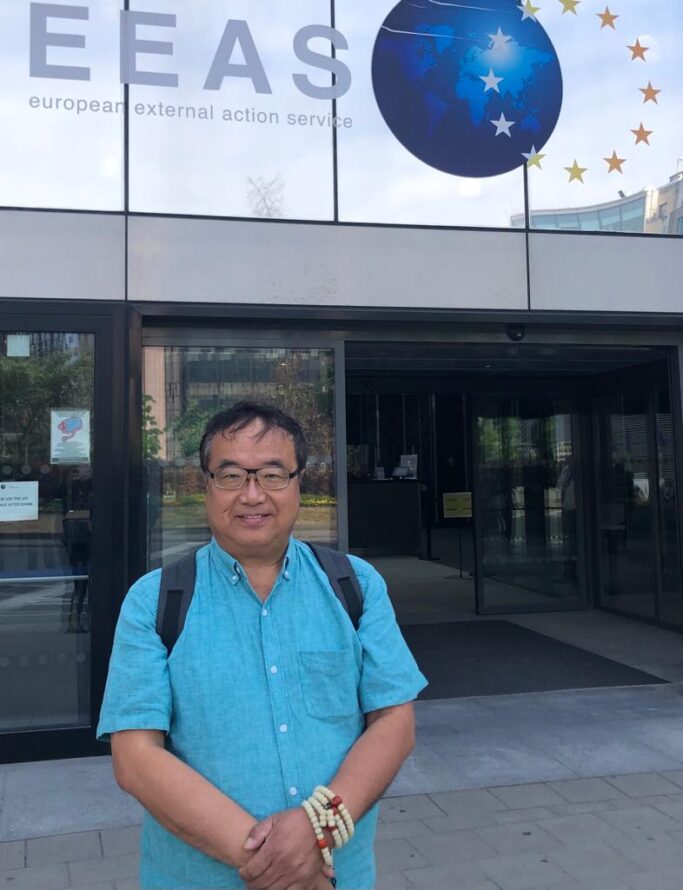Tibetan scholar and educational sociologist Dr. Gyal Lo concluded earlier this month an advocacy tour to Belgium, the Netherlands and Italy, where he warned about the harmful impact of China’s assimilationist education policies in Tibet.
The visit, co-organised by the International Campaign for Tibet and the Offices of Tibet in Brussels and Geneva – and with the support of Italia-Tibet Association in Italy – between 27 June and 4 July, follows the denunciation by United Nations experts and bodies of the Chinese government’s residential boarding schools policy earlier this year. Several governments or parliamentarians have since also expressed concerns about it, including in Canada, Belgium, the Czech Republic, France and Germany as well as the European Union (EU).
“The visit was extremely positive. Dr. Gyal Lo’s first-hand research and testimony greatly helped us engage governments and parliamentarians in a serious conversation resulting in concrete ideas to address the terrible situation of Tibetan children in Tibet and the impact of such policies on the Tibetan culture and identity. The colonial nature of this ruthless policy of the People’s Republic of China was unmasked,” said ICT Europe Executive Director Wangpo Tethong.
Key witness of China’s boarding school system
Dr. Gyal Lo is an educational sociologist and leading expert on the Chinese government assimilation policies in Tibet, and particularly on the colonial boarding school system for Tibetan children.
In 2016, he personally witnessed the impact of these policies on his own grandnieces who, after just three months of attending a boarding pre-school, started to communicate in Chinese with each other and grew emotionally distant from their family. Appalled by this situation, he undertook academic field work, visiting over 50+ boarding schools to document their impact on the children and their communities.
According to his research, up to 1 million Tibetan children are systematically alienated from their language and culture in those compulsory boarding schools, potentially facing psychological and emotional harm and subjected to highly politicized education in Chinese.
Now living in exile in Canada due to safety concerns, his work has been instrumental in alerting the international community about the scale of China’s unprecedented and harmful assimilation campaign.
EU and EU Member States urged to take action
During his meetings in the three countries visited – including with diplomats from the Belgian and Dutch Ministries of Foreign Affairs, the European External Action Service and Members of the European and Italian Parliaments – Dr. Gyal Lo emphasized the dramatic and irreversible impacts of China’s boarding school system. “If this policy continues, Tibetan culture and identity will be eradicated within 15 to 20 years” he warned his audience.
He also proposed several actions that the EU and European countries could take, such as requesting the Chinese government to allow EU diplomats to visit boarding schools and adopting sanctions against Chinese officials responsible for overseeing the education system. The academic further insisted on the importance of developing curricula and teaching material that are culturally relevant for Tibetan children and allow them to learn about their history, culture and traditions.
During a press conference titled “China’s colonial education system in Tibet: Lessons for Italy and EU to defend values of an open society” held in the Italian Senate on 4 July, the Chair of the Italian Parliamentary Intergroup for Tibet Senator De Priamo explained: “Our idea is to formulate an appeal, which comes from all political forces and, as such, represents the entire Parliament, to ask the European Union for a visit agreed with the Chinese government in educational centers in Tibet to understand what space is left for the identity and culture of the Tibetan people.”
Throughout the tour, Dr. Gyal Lo further had the opportunity to exchange with civil society members – including NGOs and academics – as well as with Tibetans living in the countries visited, who he commended for their critical efforts to preserve and sustain the Tibetan language and culture in exile. Particularly moving was his encounter with young Tibetan students of the Tibetan Sunday School in Amsterdam, who left feeling like “superheros” for their efforts to study Tibetan.
He also gave a number of interviews to several national media – which he hopes will contribute to raise further awareness about the dire situation of Tibet’s “stolen children.”
